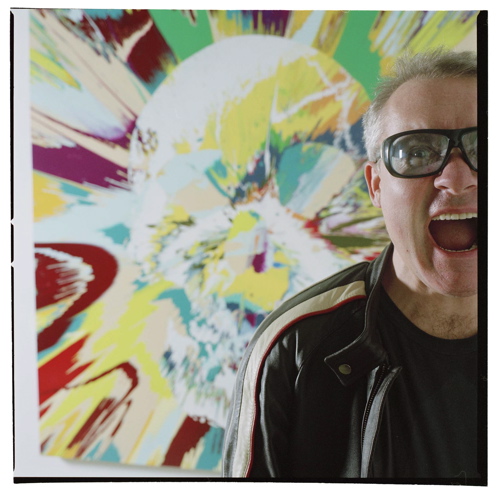I've been researching Green Chile Chorizo, a recipe originating in Toluca, Mexico so I have read. I want to pair a red, green and white chorizo for a project/tasting coming up. The white recipe may be elusive, since there aren't many white meats, but we'll see. As I've been postponing more and more this cooking venture I've thought a lot about what my last post detailed. I feel it's all based in my inner dialog as an artist, but this attitude also reigns prominently in the art world at large as well.
This argument addresses IMHO art with intention versus making "consensus-friendly decoration", as the Guardian blogger Jonathan Jones puts it. I think that might be the case. I am reminded of what some friends said once, that..."the audience for artists is other artists." In my last post I mentioned Damien Hirst, the quintessential famous wealthy successful artist. I noticed today that he held an actual show of paintings done with his own hand and critics tore him apart. It was partly that he showed his work next to works by master painters, and partly that the guy just doesn't have the talent to make technically skilled art. He even said of his own color spin paintings that they were "basically meaningless." Maybe collectors don't care, but then it's obvious that an investment in art is not in meaningful expression, but in a commodity no different from a credit default swap. It turns out that skill does matter in some cases.

This brings me to other aspects of art as commodity like Jeff Koon's recently unveiled art car.

This is a real car, I think. I actually don't know, but I saw a picture of him sitting on the real thing. Yes he's rich, and yes his work is vapid. These works, Koons' and Hirst's, are signs of how strongly object and commodity are still held together, and how empty they are despite the dollar value. I hear not that MOMA is now collecting performance much like you collect a painting. They collect the instructions on what it is and then re-stage the performance when they like. How strange is that? Something that is temporal by nature is forced to become a commodity. Then they can sell it, even though it's essentially non-existent other than when it took place. It's like the shower you took today becoming art and then someone selling the idea that you took a shower to someone else. Then they pay a young sexy New Yorker to take a shower in the same circumstances and call it equal to the shower you took. Maybe there's some inherent genetic predisposition by humans to need to associate monetary value to each and every thing, but I don't know that I get this compulsion.
Now our art world is blogging/tweeting heavily about a new TV show called Work of Art, which is basically a competition by artists to one-up each other and get a big bag of money for their efforts, and maybe for being a good artist. It's so strange that this is what they claim will bring appreciation of art to the masses, making artists perform akin to fear factor or iron chef. Why not make artists cook against one another and then be forced to eat all the food before running an obstacle course? It makes about as much sense as the real show.
I'm not sure where I'm going with this, nor am I sure where to go with art in general. It's not to avoid objects for the sake of it, but more to think about what an expression is at its core and why we need objects to convey that expression. Art objects are great, and you'll see that in my apartment that I surround myself by them. I just like to think about these conundrums, and the daily occurrences in the art world. When I read about ideas about reformulating art in society both within and without capitalism, like in the new e-flux journal 17, it really gets my gears going. This makes me wonder about all this stuff we make and what we do with it. What the value of this stuff is, and what the purpose of over-valued stuff is too. I need to get a few tomatillos and I'm going to make some Green Chorizo, inspired by Rick Bayless. That is something I can put a fork in, tell it's done, and then eat knowing that I enjoyed it because taste-buds lie way less than art does.


No comments:
Post a Comment